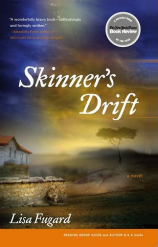Skinner's Drift
Review
Skinner's Drift
In Lisa Fugard's debut novel, SKINNER'S DRIFT, a prodigal daughter returns to her father's farm in Africa for the first time in ten years. Eva van Rensburg fled not only the farm, but her country and her relationship with her father after her mother was accidentally shot and killed. For Eva, South Africa is a place of contradictions, and she must confront them and her relationship to her family and her history as her father's health fails and she is called home.
Skinner's Drift is Martin van Rensburg's farm along the Limpopo River, which forms the border with Botswana. The Afrikaner van Rensburg settles his English wife and their daughter there and begins to carve a life in the dusty hills. Eva feels isolated by her mother's Englishness and later by her father's intensity and violence. Martin is a man fiercely proud of his heritage and his land, humbled only by the stutter that slows his tongue. His wife Lorraine loves the farm at first but comes to resent its hold on her husband and the harsh conditions of life there. Eva and her father share a special bond until one night a hunt turns disastrous. She spends the rest of her time on Skinner's Drift trying to atone for her father's crime and eventually, when her mother dies, leaving her father, the farm, and South Africa for America.
When Eva returns, at her aunt's request, she believes she is coming home to bury her father. The political and social changes that had begun before she left have transformed South Africa into a place unfamiliar to her in some ways. It is 1997 and apartheid is over, but the damage on the culture and people remains. Still, the landscape and many of the faces welcome Eva home. When she finally visits Skinner's Drift she finds Lefu, an African farmhand employed by her father, still working the land and the bond she shares with him is still strong. However, he has learned of the secret she has been keeping all these years about what happened that night while hunting with her father, and he has shared it with his grandson Mpho.
Can Eva come to terms with her past, with her identity, and with the realities of her homeland? Can she forgive her father and herself? Will she begin to understand the depths of her mother's loneliness? Fugard's lovely novel centers on these questions. Although her literary devices are expected (flashbacks, diary entries, family secrets), they don't feel stale or contrived. Fugard's style is fresh and readable, and her characters are frustratingly real. The isolation and tension as well as the natural beauty of Skinner's Drift come alive with the author's descriptions.
Eva is not always an easy character to like. Her sadness and pain are obstacles, and she comes across as smug or uncaring at times. But this is in keeping with Fugard's realism, a realism not untouched by poetry and a romantic streak. By far the most notable characters are Lefu and his family, his daughter Nkele, and her son Mpho. They are an interesting parallel and contrast to the van Rensburgs.
SKINNER'S DRIFT is dramatic and immensely readable. While not wholly original in content, Fugard's style saves the book from being ordinary. Eva's shame and her confusion about home and identity are wonderfully set against the fraught background of South Africa in the 1980s. Fugard nicely captures the tensions of her very real setting as well as those inside her fictional characters.
Reviewed by Sarah Rachel Egelman on March 6, 2007
Skinner's Drift
- Publication Date: March 6, 2007
- Paperback: 320 pages
- Publisher: Scribner
- ISBN-10: 0743273338
- ISBN-13: 9780743273336




